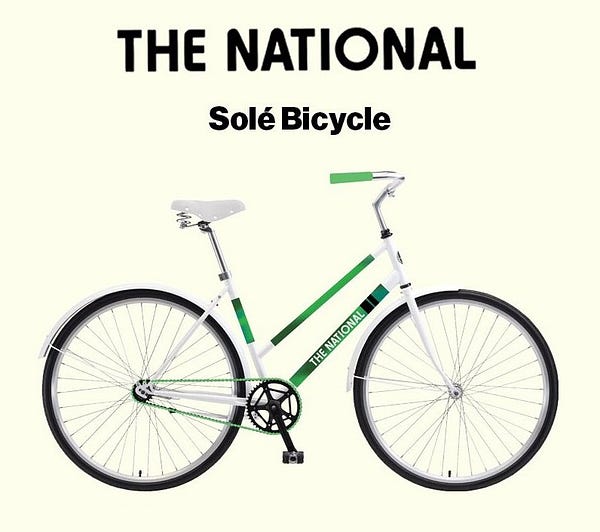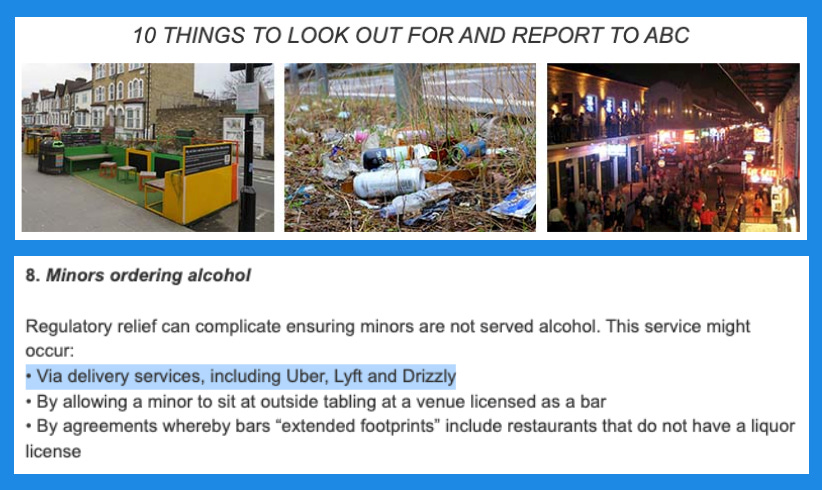Delivery workers ≠ bouncers
Forcing booze delivery workers to card drunk customers? What could go wrong!
🆔 Forcing booze delivery workers to card people? What could go wrong!
Editor’s note: The item below is being reprinted with permission from the 7/28/22 edition of Expedite, a super-sharp independent newsletter about restaurant technology and the future of hospitality by journalist Kristen Hawley. I’m a paid subscriber to Expedite, and if you work in/around restaurants, tech, or restaurant tech, you should be too. Here’s 25% off just for the Fingers Fam!
Honestly, one of the more humane developments to come out of restrictive city policies during the pandemic is the increased availability of alcohol on demand. Plenty of places across the country started allowing takeout cocktails, beer, and wine where there were none before. This was, to be totally honest, a personal bright spot during some of the darkest days of lockdown.
Now food delivery companies like DoorDash can deliver it too — but with great power comes greater responsibility. Last week, DoorDash rolled out a new two-step verification process for its drivers to make sure they’re only delivering the good stuff to app users of legal drinking age.
Customers will still have to upload a copy of their ID upon ordering, but now to receive the delivery, a DoorDash driver needs to scan the ID, too. Apparently, the driver is also required to… check for signs of intoxication in customers, which seems like a lot of responsibility for a contract worker just trying to make deliveries.
A piece in the Takeout points out that DoorDash provides its drivers with guidelines for alcohol deliveries, but if the driver hands over an order to the wrong person — an underage customer, or one who’s already too drunk — it’s the driver who’s held liable. DoorDash’s guidance advises drivers to “Politely tell the customer that you cannot deliver the alcohol,” and, if things go really bad, “Should a potentially tricky situation arise, get to a safe location and call the police.”
(For what it’s worth, Uber’s guidance for alcohol delivery is similar, requiring drivers to check for intoxication and also to upload photos of the customer’s valid ID.)
Reminder: Fingers readers get 25% off annual subscriptions to Expedite, the best restaurant-tech newsletter on the internet. I highly recommend it, so don’t miss out, grab yours today!
📬 Good post alert


See a good post that the Fingers Fam should know about? Please send me that good post via email or Twitter DM.
#️⃣ Digits: “The noncompliance rate was extremely high”
Hey, it’s your fearless Fingers editor again. I’m BACK baby, and I’ve got some thoughts of my own about this new ID-checking development in delivery booze. Like Kristen, I think alcohol on demand rocks and should be expanded wherever and whenever possible. Also like Kristen, I think it’s very unfair, even dangerous, to ask delivery workers to take on the responsibility and legal liability of keeping alcohol out of the hands of people too drunk to consume it.
First and foremost, this is a labor issue. Workers hired to do one thing (bring more Cayman Jack Mango Margaritas directly to your door so you don’t interrupt your book club’s Settlers of Catan-a-thon with a DUI) should not be forced to do another (evaluate how many Cayman Jack Mango Margaritas you’ve had, which, Jesus man, it smells like an old smoothie in here, how long has this Catan-a-thon been going?) by a publicly traded company worth billions of dollars that demonstrably does not prioritize their well-being. (Yes, DoorDash claims its “dashers” average ~30% more running booze; no, that’s not commensurate with the potential consequences.) It’s not hard to figure out what workers will do in this situation: cut corners, because they’re not getting paid enough for that shit! Which probably explains why, in a sting operation last year designed to test the state’s expanded to-go laws, Virginia Alcoholic Beverage Control agents found that…
32 out of 52 “underage” decoy buyers
…were able to complete illicit purchases of delivery booze, according to a report from Pew Trust’s Stateline news outlet a few months back. That’s over 60%! A pair of similar enforcement experiments in California yielded violation rates of 79% and 53% in 2020, though that state—whose to-go cocktail law expires in 2026 but no longer allows deliveries—has since reduced the rate to 20% for beer and wine. (In-person compliance rates usually hover around 10%.) Not good! Back in the Commonwealth: “The noncompliance rate was extremely high,” a VABC official told Stateline.

Big Delivery shunting corporate responsibility, more physical risk, and even legal liability onto already-marginalized delivery workers is de facto bad from an ethical perspective. But beyond the labor implications (which, again, suck!) lurk another, more sweeping threat: reactionary regulation. A system rigged for profit rather than—or worse, at the expense of—compliance is an invitation for beverage-alcohol’s many social and political foes to paint the booze biz at large with a broad, unflattering brush in order to advocate for more restrictions. Make no mistake, neo-prohibitionists are gunning for on-demand Mango Margaritas, and shoddy delivery protocols provide potential ammo to put the kibosh on everyone’s Cayman Jacked Catan-a-thon. Unsettling!
🤝 Whole Foods’ lead beer buyer Mary Guiver on spotting trends and building categories
This week behind the paywall, I published an interview with Mary Guiver, the principal category merchant for beer & spirits at Whole Foods Market. I’d called Mary a few weeks ago to talk about what it would take for the specialty supermarket to back the dairy-based booze category in its beverage-alcohol program. We got to talking about Cayman Jack Mango Margaritas how she keeps an eye on emerging beverage trends, what it takes to successfully pitch unconventional beverage-alcohol products to Whole Foods customers, and how she evaluates a product’s backstory when deciding whether to try it out in the cold box. (Plus lots more.) Whether you work for a beverage brand and Whole Foods is on your retail roadmap, or you’re just fascinated, like I am, by the “dark miracle” of American grocery, this is a must-read.
Paying subscribers get access to this and every full-length interview at Fingers, plus every episode of The Fingers Podcast. If you haven’t yet, please buy a subscription today:
I depend on reader support to fund the boozeletter’s independent journalism. Thanks to all the paying Friends of Fingers who have stepped up to underwrite this work!
🧾 The Settle-Up
Speaking of Neo-Prohibition, Here’s 5,000 Words from Inside the “New Temperance Movement”
Facing CO2, Business Woes, MA’s Once-Surging Night Shift Warns of Layoffs, Outsources Production
Starting to Get A Bit Alarmed by Sheer Volume of Hard MTN Dew People Are Buying, You Guys
High Noon Is Winning Shelf Shootout with Beer, White Claw, Truly, Just as Seltzperts Foretold!
JUUL, Once Worth $38B, Takes a 70% Valuation Hit from Federal Hammer. Brewers Flirting with FDA/TTB Labeling Rules, Take Note!
I Regret to Report That Reason Magazine Has Published Yet Another Solid Booze Column
I’m Sorry, *How* Much Sugar Did Original-Formula Capri Sun Contain?!
Napa Valley’s Supermarket Wine Titans Try to Modernize with NFTs, Premium Tastings, Etc.
Modern Times Beer, Craft Brewing’s Latest Icarus, Finally Has Buyer in Maui Brewing Co.
📲 The best Fingers meme ever and/or lately
Don’t miss out, follow Fingers on Instagram today. It’s free and your feed will thank you. (Not really, that would be weird. But you know what I mean.)







